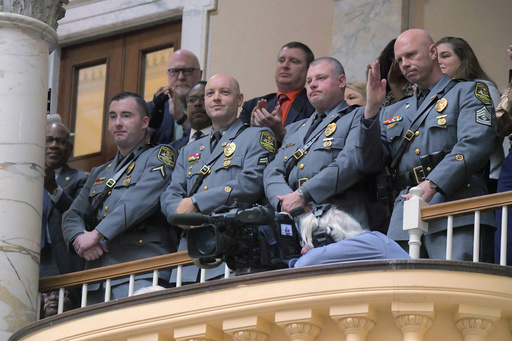
ANNAPOLIS, Md. — Maryland’s Governor, Wes Moore, is grappling with significant budgetary challenges and the impact of President Trump’s recent actions aimed at reducing the federal workforce, which is essential to the state’s economy. During a speech to lawmakers, he emphasized the need for Maryland to bolster its economic foundations and lessen its dependence on federal employment.
Moore, a Democrat noted for his rising prominence in the party and potential presidential aspirations, characterized the state’s pressing $3 billion budget deficit and the fresh federal administration’s policies as “two storms” that have converged. He stated, “We are currently facing an extraordinary fiscal crisis — one that rivals the challenges experienced during the Great Recession. On top of this, we are confronting a new administration in Washington that is bringing about uncertainty and disruption.”
The early actions of the Republican president have rattled the heavily Democratic state, particularly with the announcement of a federal hiring freeze and a broad buyout initiative prompting federal employees to resign voluntarily. Additional complex executive orders, such as one that suddenly froze and later unfroze federal grant allocations, have further complicated the situation, intensifying fears in a state closely linked to the federal capital.
“These ideological shifts will undoubtedly inflict harm on our middle class, which is already grappling with rising inflation,” Moore remarked. He expressed concern that these actions signify a troubling departure from a long-standing relationship and norms upheld by leaders of both parties and various backgrounds between Washington and Maryland.
Governor Moore expressed hope for collaboration with both the new presidential administration and the Republican-controlled Congress. He aims to strengthen the Maryland-Washington partnership that has historically benefited residents across the entire nation, regardless of party affiliation. However, he cautioned that the policy shifts seen in recent weeks could lead to disappointing realities. “At a moment when our nation craves clarity, we are met with chaos,” he noted. “When vision is essential, we are faced with hysteria,” he added.
Approximately 20% of the nation’s federal workforce resides in Maryland, Virginia, and the District of Columbia. In Maryland, federal employees account for about 5.7% of total state employment, notably higher than the national average of 1.9%, according to the state’s 2024 report. The federal government also plays a crucial role by supporting numerous private sector suppliers, contractors, and subcontractors within Maryland, providing a $42 billion investment to local businesses in 2022, which constituted around 10% of the state’s GDP.
To address these challenges, Moore outlined strategic priorities, focusing on three key industries identified as pivotal for the future: life sciences, information technology, and aerospace and defense. He underscored the need to bridge the budget deficit while simultaneously fostering the middle class, enhancing economic diversity, and breaking the state’s substantial reliance on federal employment.
In response, Maryland Republicans contend that the state is falling short but disagree with the governor’s attribution of these issues. State Sen. Steve Hershey, who leads the Maryland Senate minority, stated, “Maryland families are facing financial hardships, elevated energy costs, and rising prices due to costly policies and heavy regulation instituted by a Democratic supermajority — not because of past administrations or the current leadership in Washington.”
Governor Moore is attempting to tackle the state’s budget for the upcoming fiscal year by proposing an increase in income tax rates for those earning over $500,000, along with approximately $2 billion in cuts to state government expenditures to offset the $3 billion deficit. His proposal introduces a new 6.25% tax rate for individuals above the $500,000 income threshold and a 6.5% rate for those exceeding $1 million. Additionally, incomes over $350,000 would incur an extra 1% tax applicable to capital gains from stocks and other assets. Moore asserts that 82% of Maryland residents will experience either a tax reduction or no increase in taxation, along with recommending a decrease in the corporate tax rate.

